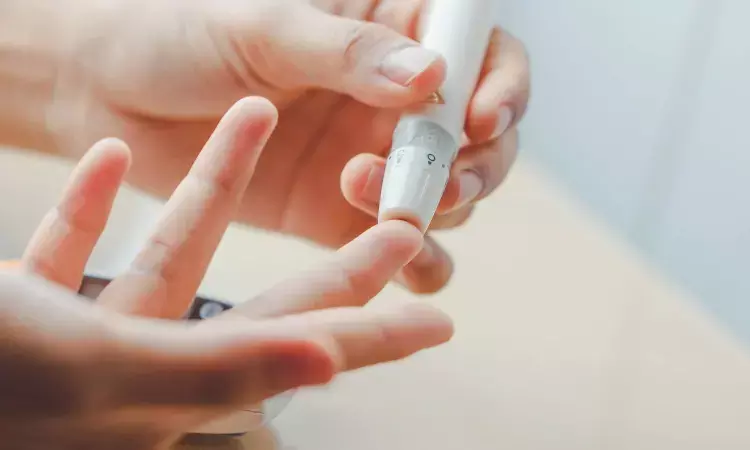- Home
- Medical news & Guidelines
- Anesthesiology
- Cardiology and CTVS
- Critical Care
- Dentistry
- Dermatology
- Diabetes and Endocrinology
- ENT
- Gastroenterology
- Medicine
- Nephrology
- Neurology
- Obstretics-Gynaecology
- Oncology
- Ophthalmology
- Orthopaedics
- Pediatrics-Neonatology
- Psychiatry
- Pulmonology
- Radiology
- Surgery
- Urology
- Laboratory Medicine
- Diet
- Nursing
- Paramedical
- Physiotherapy
- Health news
- Fact Check
- Bone Health Fact Check
- Brain Health Fact Check
- Cancer Related Fact Check
- Child Care Fact Check
- Dental and oral health fact check
- Diabetes and metabolic health fact check
- Diet and Nutrition Fact Check
- Eye and ENT Care Fact Check
- Fitness fact check
- Gut health fact check
- Heart health fact check
- Kidney health fact check
- Medical education fact check
- Men's health fact check
- Respiratory fact check
- Skin and hair care fact check
- Vaccine and Immunization fact check
- Women's health fact check
- AYUSH
- State News
- Andaman and Nicobar Islands
- Andhra Pradesh
- Arunachal Pradesh
- Assam
- Bihar
- Chandigarh
- Chattisgarh
- Dadra and Nagar Haveli
- Daman and Diu
- Delhi
- Goa
- Gujarat
- Haryana
- Himachal Pradesh
- Jammu & Kashmir
- Jharkhand
- Karnataka
- Kerala
- Ladakh
- Lakshadweep
- Madhya Pradesh
- Maharashtra
- Manipur
- Meghalaya
- Mizoram
- Nagaland
- Odisha
- Puducherry
- Punjab
- Rajasthan
- Sikkim
- Tamil Nadu
- Telangana
- Tripura
- Uttar Pradesh
- Uttrakhand
- West Bengal
- Medical Education
- Industry
Inpatient hyperglycemia, regardless of diabetes status, tied to risk of AKI, stroke, and infections: Study

Australia: Inpatient hyperglycemia leads to harmful outcomes for all hospital patients, irrespective of whether they have diabetes, a recent study published in The Journal of Clinical Endocrinology & Metabolism has suggested.
"Hyperglycemia in-hospital raises the risk of healthcare-associated infection (HAI), stroke, and acute kidney injury (AKI)," the researchers reported. "Patients who experienced hyperglycemia without a prior diabetes diagnosis had a greater risk of mortality."
Hyperglycemia in hospital inpatients without pre-existing diabetes is linked with increased mortality. However, there is no clarity on the independent contribution of hyperglycemia to acute kidney injury, stroke, and healthcare–associated infection. Therefore, Rahul D. Barmanray, The University of Melbourne, Melbourne, Australia, and colleagues aimed to investigate the relationship between hyperglycemia and adverse clinical outcomes in hospital for patients with and without diabetes.
For this purpose, the researchers performed Diabetes IN-hospital: Glucose and Outcomes (DINGO), a 26-week (October 2019-March 2020) prospective cohort study. Glucose and clinical data were collected up to the 14th day of admission. Primary stratification was by hyperglycemia, defined as ≥2 random capillary blood glucose (BG) measurements ≥11.1 mmol/L (≥200 mg/dL).
To allow interrogation of causality, propensity weighting for nine clinical characteristics was performed. To maintain the positivity assumption, patients with HbA1c >12.0% were excluded and prehospital treatment was not adjusted for.
The study was set in the Royal Melbourne Hospital, a quaternary referral hospital in Melbourne, Australia. Admissions with at least 2 capillary glucose values and a length of stay >24 hours were eligible, with half randomly sampled. Outcome measures were AKI, HAI, stroke, and mortality.
The study led to the following findings:
- 45% experienced hyperglycemia in hospital of 2558 included admissions.
- Following propensity-weighting and adjustment, hyperglycemia in hospital was found to, independently of 9 covariables, contribute to an increased risk of in-hospital HAI (11.3% vs 7.1%, adjusted odds ratio [aOR] 1.03), AKI (10.5% vs 4.2%, aOR 1.07), and stroke (0.9% vs 0.1%, aOR 1.05).
"In hospital inpatients (HbA1c ≤12.0%), regardless of diabetes status and prehospital glycemia, hyperglycemia raises the risk of in-hospital HAI, AKI, and stroke compared with those not experiencing hyperglycemia," the researchers concluded.
Reference:
Barmanray, R. D., Kyi, M., Worth, L. J., Colman, P. G., Churilov, L., Fazio, T. N., Rayman, G., Gonzalez, V., Hall, C., & Fourlanos, S. Hyperglycemia in Hospital: An Independent Marker of Infection, Acute Kidney Injury, and Stroke for Hospital Inpatients. The Journal of Clinical Endocrinology & Metabolism. https://doi.org/10.1210/clinem/dgae051
Dr Kamal Kant Kohli-MBBS, DTCD- a chest specialist with more than 30 years of practice and a flair for writing clinical articles, Dr Kamal Kant Kohli joined Medical Dialogues as a Chief Editor of Medical News. Besides writing articles, as an editor, he proofreads and verifies all the medical content published on Medical Dialogues including those coming from journals, studies,medical conferences,guidelines etc. Email: drkohli@medicaldialogues.in. Contact no. 011-43720751


